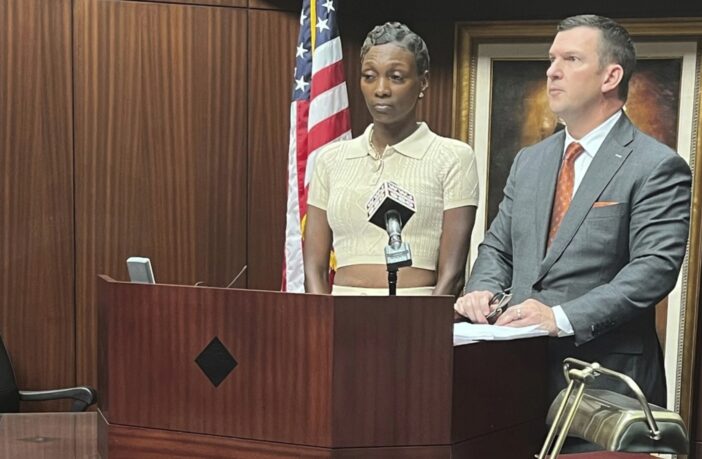By Aziah Siid
Word in Black
What was supposed to be a routine field trip to the courthouse turned into a nightmare for 15-year-old Eva Goodman, a Detroit teenager, who found herself handcuffed, forced into jail clothes, and detained for hours — all under the orders of Michigan’s 36th District Court Judge Kenneth King.
Latoreya Till, left, the mother of a 15-year-old girl who fell asleep in the Detroit courtroom of 36th District Court Judge Kenneth King, while on an Aug. 13 field trip, is suing the judge according to her attorney James Harrington, right, as they speak at a press conference in Southfield, Mich. on Aug. 21.
The dehumanization and mistreatment of the teen during the Aug. 13 incident sent shockwaves through Detroit, and people across social media asked why the child was treated so poorly, and speculated on if Eva had not been a young Black girl, would she have been treated the same
The questions highlight the broader issue of the adultification of Black children — how they are often perceived as older and less innocent than their White peers, leading to harsher treatment. Given that the teen is homeless, the incident also put the plight of Black students who are housing insecure in the spotlight.
The adultification of Black kids
Research shows that due to racial bias, people simply don’t assume the best of Black children, and are apt to criminalize them. Whether they’re in school or on a field trip, because of this bias, Black children are expected to behave like adults, and they’re deprived of the care, concern, grace, and empathy given to their White peers. They are adultified.
“When people see Black children, if they don’t see them as people, they definitely don’t see them as children,” Amir Gilmore, assistant professor of cultural studies and social thought in education at Washington State University, explained to Word In Black last year.
Indeed, people may fall asleep in court due to medication, a medical condition, the temperature in the courtroom, or not understanding the court proceedings. But instead of assuming Eva was tired for a good reason, King assumed she had fallen asleep to disrespect him.
“It wasn’t so much, in fact, that she had fallen asleep because I have attorneys that fall asleep sometimes, so that’s not too big of a deal. It was her whole attitude and her whole disposition that disturbed me,” King told 7 News Detroit in an Aug. 14 interview. “I wanted to get through to her, show how serious this is and how you are to conduct yourself inside of a courtroom.”
Eva and her mother say the judge took an unnecessarily harsh approach to the teen. As a result, Eva — along with her mother Latoreya Hill — is suing Judge King, alleging that he violated her Fourth Amendment rights. The lawsuit states that King’s actions were his own version of “Scared Straight,” a misguided attempt to “teach a lesson” that left Eva traumatized and humiliated. In the wake of the lawsuit, Judge King has been temporarily removed from the docket and is expected to undergo additional training.
“It’s been pretty devastating. Eva doesn’t want to come outside … It’s hard for her to sleep at night. She’s asking me, ‘why did the judge do me like this out of all the kids?’ Like she’s really not understanding the or the whole thing of the system or what happened or was going on,” Hill said at a news conference after the incident.
A Crisis of Housing Insecure Students
The judge was so busy disciplining Eva he failed to learn she and her family are unhoused. Till told NBC News that they have no permanent housing at the moment, and actually arrived late where they were staying the night before the field trip.
A recent analysis of students in Detroit found that “Black students were at a greater risk of homelessness than their peers of other races at 86 percent of students who were homeless compared to 83 percent of students overall.” At a national level, an analysis of federal data found that “Black high school students are 2.25 times more likely to experience homelessness.”
Given their lack of housing, Eva’s mom expressed her outrage over what King said to her daughter to Detroit’s WXYZ-TV.
“The fact that he was talking about ‘You go home and get in your bed,’ how do you know my baby got a home? How do you know my baby got a bed, her own bed she could sleep in? She don’t have that right now, so she was tired,” Till said.
King defended his decision to have the teen treated like a criminal, stating he did not like the child’s attitude. He told WXYZ-TV he hadn’t been disrespected like that in a long time.
The negative effect on Eva, however, could last for the rest of the teen’s life. “I wish I could have brought my daughter here for today, but she doesn’t want to be in front of the camera,” her mom said. “She doesn’t want to talk. She’s embarrassed, humiliated, and I can’t blame her.”
This article was originally published by Word in Black.



